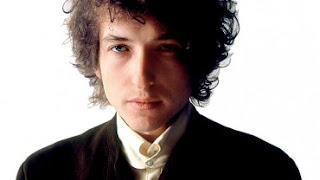 |
| Bob Dylan: courtesy Mojo (http://www.mojo4music.com/artist/bob-dylan/) |
The Dylan that sang about the changing times like a 20th century folk-youth messiah is no longer relevant, true (except every once in a long while when he can be appropriated by Apple or Victoria's Secret) perhaps because the times that were a'changin' back in the 60s have changed so many times over that even Dylan felt out of range and finally stopped caring. The political Dylan of statements and movements is dated, true, as every manifesto, every slogan, every instance of collective revolution must fall out of fashion sooner or later. But is that the end of the story?
As far as Dylan goes, it is not. A poet in India once wrote,'only that which is personal is sacred'. Only that which is personal is timeless too. The song that got me in love with Dylan was 'Don't Think Twice it's Alright'. Like every heartbroken college-goer I too had a phase of raging self-pity. Dylan rescued me out of that blackness and taught me to look for pride in loss. That was probably the only song I could fully understand at that age: the unashamed celebration of anti-love, of the proud individual who walks out of the demise of intimacy to discover beauty in alone-ness. And yet, who says that Dylan is all cynical about intimacy? Like a brutal commentator of modernity he does accept the complexities, paradoxes and the impossible resolutions of mutually conflicting choices, and in the chaos of all this non- understanding, quietly refuses to give up the ideal that Johanna is. Who else but he could insist, 'I want you' with such incantatory firmness?
When the noises of protest have died , there is a Dylan--a private Dylan, a tortured Dylan, a bleeding Dylan who is Everyman and woman in love and out of it. This could be love in the sense of charity, yes, but where Dylan is essentially himself is the eternal space of eros that have inspired the most triumphant acts of lyrical enunciation everywhere, in every culture. Let's not forget that private Dylan of the modern individual, defeated by the contradictions of his own desire and crying into the secrecy of his pillow.
'Tangled up in Blue' took him two years to write and ten years to live: we, his lovers, are living out his verses and choruses everyday, in deep, secret and unspeakable ways. We don't stop living Dylan till we die as laughing, crying and desiring individuals. Everybody who has discovered freedom in a break-up ('Don't Think Twice'), has found it impossible to end a bad affair because the ideal inspiring it refuses to die ('Tangled Up in Blue'), has discovered a sudden compassion for an unfaithful ex whom one would love to flay alive ( 'Like a Rolling Stone') --anyone, in other words, who has celebrated mortal love and loss in any whichever way, has been tangled up in Dylan whether or not one knows it. Hope, the Nobel prize at least reminds us of that.